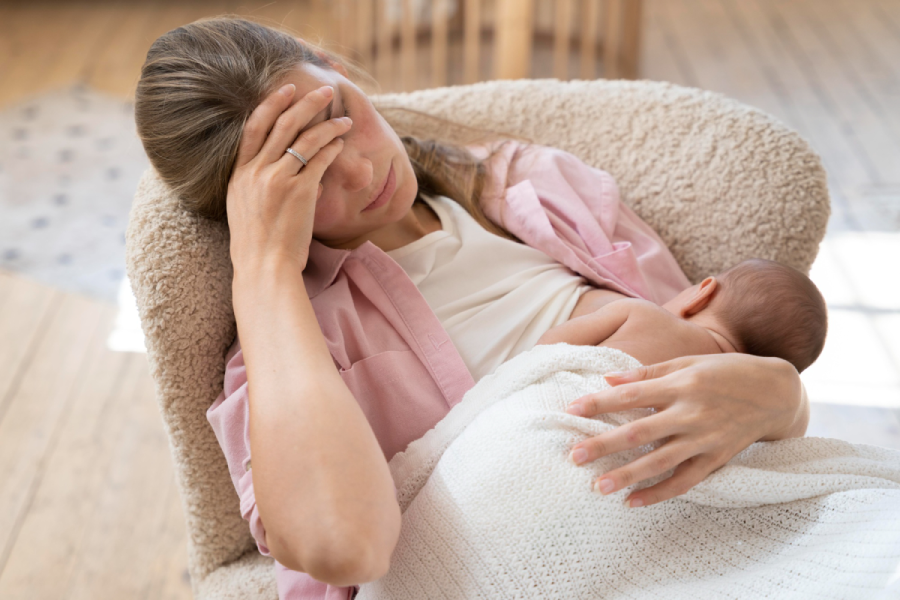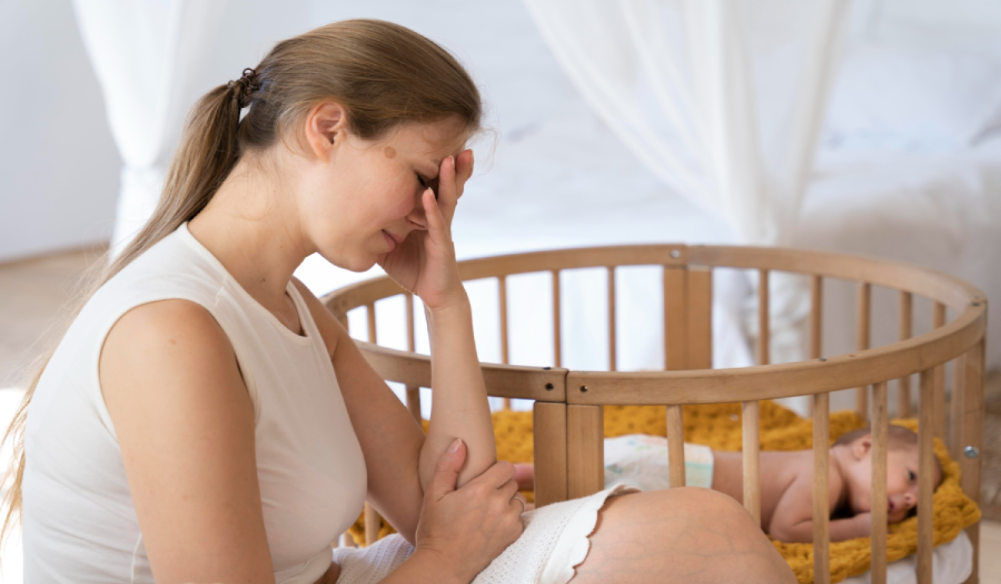Becoming a parent, and having a baby is a life-changing experience. It is exciting but also tiring at the same time and it comes with its own set of new challenges.
Postpartum depression, often abbreviated as PPD, is a type of mood disorder that affects women after childbirth. “Partum” refers to childbirth or the process of giving birth. The term is often used in medical contexts or discussions related to pregnancy and labor.PPD can occur shortly after childbirth or even develop several months later. It is a form of clinical depression that affects women after giving birth. This condition involves a range of emotions; and physical symptoms that can be severe and significantly impact a woman’s ability to function, take care of herself, and bond with her baby. An estimated one in seven women experiences postpartum depression. (Dave, et.al 2010)
American Psychiatric Association has defined Post-Partum Depression as “Perinatal depression which refers to depression occurring during pregnancy or after childbirth. The use of the term perinatal recognizes that depression associated with having a baby often begins during pregnancy.”(APA, 2023)
Postpartum Depression Symptoms:
A person experiencing perinatal depression usually has symptoms a few days, weeks, or even months after birth like:
- Feeling sad or having a depressed mood
- Loss of interest or pleasure in activities they once enjoyed
- Changes in appetite
- Trouble sleeping or sleeping too much
- Lack of interest in the baby, not feeling bonded to the baby, or feeling very anxious about/around the baby
- Feelings of being a bad mother
- Fear of harming the baby or oneself
Symptoms given above and many other similar symptoms may cause a postpartum person to feel isolated guilty or ashamed. To be diagnosed by a mental health professional, symptoms must be during pregnancy or within one year following delivery.
Effects of Postpartum or Perinatal Depression
Perinatal Depression, if left untreated, doesn’t just impact the individual’s health and life quality but can also affect the baby leading to premature birth or low birth weight. It can hinder bonding and result in sleep and feeding issues for the baby.
Additionally, children born to mothers experiencing perinatal depression are at greater risk for cognitive, emotional developmental, and verbal deficits and impaired social (Field 2010; Brand& Brennan 2009).

PPD may lead to poor maternal-infant bonds, failure of breastfeeding, negative parenting practices, marital discord, as well as worse outcomes concerning the child’s physical and psychological development. The remission of symptoms will reduce the risk of behavioral and psychiatric problems in the offspring.
Postpartum depression affects the mother, father, and infant.
Mother: It can lead to chronic depressive disorder if not treated on time. Even if treated, PPD can be a risk for future episodes of major depression. The results of the study done by Slomian and colleagues in 2019 suggest that postpartum depression creates an environment that is not conducive to the personal development of the mother or the optimal development of a child. It therefore seems important to detect and treat depression during the postnatal period as early as possible to avoid harmful consequences.
Father: This can be a precipitating factor for depression in the father as this will be a stressful event for the entire family. The symptoms may be irritability, frustration, guilt, fatigue changes in eating or sleeping, and any of the other perinatal depression symptoms.
Infant: Children of mothers who have untreated depression can develop behavioral and emotional problems. More commonly seen are delays in language development. They can also suffer from sleeping problems, eating difficulties, excessive crying, and attention-deficit/hyperactivity disorder (ADHD). Additionally, children born to mothers experiencing perinatal depression are at greater risk for cognitive, emotional developmental, and verbal deficits and impaired social (Field 2010; Brand 7 Nremmam 2009).
Risk Factors/Causes of Postpartum Depression
Research suggests that rapid changes in sex stress hormones and thyroid hormone levels during pregnancy and after delivery have a strong effect on moods and may contribute to perinatal depression. More research is required to understand how the big drop in hormones after giving birth might lead to feeling down. When one is pregnant, certain hormones shoot up but then quickly go back to becoming a parent bringing lots of changes that can make one feel more likely to feel low. The body changes, sleep patterns are disturbed, and one might worry about how to take care of the baby or how the relationships might change. All these things can postpartum depression more likely, One of the known risk factors for perinatal depression is a history of trauma or adverse life events. (Guintivano et al, 2018b; Howell et al, 2005).
Other factors include physical changes related to pregnancy, having a child in the NICU, medical complications for the mother/birthing individual or child, changes in relationships and at work, worries about parenting, and lack of sleep.
Research also suggests that, across racially/ethnically diverse populations, social support is protective against perinatal depression and that greater social support is associated with less severe perinatal depression symptoms (Pao 2019).
Why doesn’t it get diagnosed?
Numerous women might silently endure challenges during pregnancy and childbirth, overlooking their struggles as typical. Seeking help for depression during this time is crucial. Improving awareness and comprehension can enhance the well-being of both mothers and their infants. Many choose not to disclose their symptoms, potentially due to feelings of embarrassment, shame, or the fear of being judged as inadequate mothers. It is important to recognize that any woman, regardless of background, can experience depression during or after pregnancy

Postpartum Depression Treatment
Postpartum depression is treated differently depending on the type and severity of your symptoms. Treatment options include anti-anxiety or antidepressant medicines, psychotherapy (talk therapy or cognitive behavioral therapy), and support group participation.
Like other types of depression, perinatal depression can be managed with psychotherapy (talk therapy), medication, lifestyle changes, and supportive environment, or a combination of these.
First-line treatment for peripartum depression is psychotherapy and antidepressant medications. Psychosocial and psychological psychotherapy is the first-line treatment option for women with mild to moderate peripartum depression, especially if mothers are hesitant about starting on medications and are going to nurse the newborn. A combination of therapy and antidepressant drugs is recommended for women with moderate to severe depression. ‘
Treatment for postpartum psychosis may include medication to treat depression, anxiety, and psychosis. They may also be admitted to a treatment center for several days until they are stable.
How Partners, Family, and Friends Can Help?
Strong support from partners, family, and friends is very important.
As a family member, one can recognize the signs of depression and anxiety and encourage seeking professional help if one notices them. Show the willingness to listen and understand her concerns acknowledging specific changes like sleep troubles. Provide unwavering support by offering assistance with household chores or caring for the baby to give her a break or time to reconnect with friends. It’s essential to gently encourage her to seek help, acknowledging her potential discomfort but emphasizing the importance of speaking with a healthcare professional for support. (APA,2022)
Navigating Post Partum Depression can feel like an isolating journey, but one needs to remember that they are never alone. Seeking help and support is not something to be embarrassed about or felt guilty about, it is a courageous step towards healing. Embracing this journey with patience and self-compassion is not only important for the mother’s well-being but also essential for the baby and the mother-baby bond. Every person going through this deserves support and there is strength in reaching out for the same.
References
American Psychological Association (2022).
What is Postpartum Depression and Anxiety?
(https://www.apa.org/pi/women/resources/reports/postpartum-depression) Accessed 4/13/2022.
Tobon, A L.; (2023)
American Psychiatric Association, What is Perinatal Depression?
https://www.psychiatry.org/patients-families/peripartum-depression/what-is-peripartum-depression
Brand, SR, Brennan, PA(2009);
Impact of antenatal and postpartum maternal mental illness: How are the Children? Clin Obstet Gynecol 2009; 53:441-55
Davé S, Petersen I, Sherr L, Nazareth I.(2010).
Incidence of maternal and paternal depression in primary care: a cohort study using a primary care database. Arch Pediatr Adolesc Med. 2010 Nov;164(11):1038-44.
Field, T. (2010).
Postpartum depression effects on early interactions, parenting, and safety practices. Infant Behav Develop. 2010; 33:1-6.
Pao, C., Guintivano, J., Santos, H., & Meltzer-Brody, S. (2019).
Postpartum depression and social support in a racially and ethnically diverse population of women.
Archives of women’s mental health, 22(1), 105–114.
Guintivano, J., Sullivan, P. F., et al. (2018).
Adverse life events, psychiatric history, and biological predictors of postpartum depression in an ethnically diverse sample of postpartum women. Psychological medicine, 48(7), 1190–1200.
Howell, E. A., et al. (2005).
Racial and ethnic differences in factors associated with early postpartum depressive symptoms.
Obstetrics and Gynecology, 105(6), 1442–1450.
Slomian J, Honvo G, Emonts P, Reginster JY, Bruyère O.
Consequences of maternal postpartum depression: A systematic review of maternal and infant outcomes. Women’s Health (Lond). 2019 Jan-Dec;15:1745506519844044. doi: 10.1177/1745506519844044. Erratum in: Women’s Health (Lond). 2019 Jan-Dec;15:1745506519854864. PMID: 31035856; PMCID: PMC6492376.

